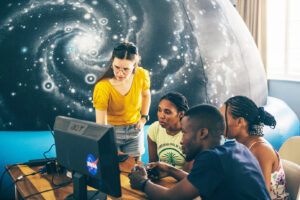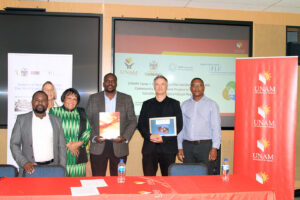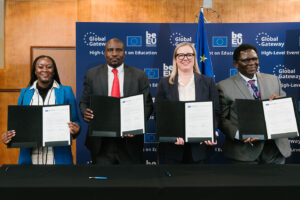“The Phoenix Project continues to spur international collaboration”
The latest shipment of clinical consumables and medical equipment donated by the Welsh Government to Namibia, arrived in the country recently. 14 large containers with equipment were officially received by the Ministry of International Relations and Cooperation (MIRCO) and handed over to the Ministry of Health and Social Services in the capital, Windhoek, middle February 2022.
The multi-million dollar donation strengthens the Namibian government’s health efforts to curb the spread of COVID-19, by providing much-needed personal protection equipment, ventilators, training, and consumables. So far the Namibian government has administered more than 700 000 doses of vaccines to a total population of about 2.5 million people living in Namibia.
The donation from the government of Wales was made possible through the Welsh and Africa Grant Scheme, and the Phoenix Project, a longstanding partnership between the University of Namibia and Cardiff University. British High Commissioner, H.E. Mr Charles Moore praised the Phoenix Project, listing a number of its other accomplishments with UNAM, such as research collaboration, communication, health promotion campaigns, and environmental sustainability.
His Excellency, Mr. Moore accompanied by the High Commissioner of Namibia to the United Kingdom, H.E. Ambassador Linda Scott handed over the donation on behalf of the Welsh Government.
“This donation represents a gift from the government and the people of Wales who have developed a strong relationship with Namibia over the past decade”, remarked H.E. Mr Moore.
Praises were extended, in absentia, to Professor Judith Hall from Wales, who leads the Phoenix Project.
Honorable Netumbo Nandi-Ndaitwah, Deputy Prime Minister of Namibia, and Minister of MIRCO, who accepted the donation on behalf of the Namibian Government, said: “International solidarity has been crucial in overcoming this pandemic, and this donation marks such solidarity”. She further lauded Professor Kenneth Matengu, UNAM Vice-Chancellor, for representing Namibia exceptionally on the issue of COVID-19.
A key Namibian figure, Dr Kalumbi Shangula, Minister of Health and Social Services, also present at the event, remarked: “This is yet another demonstration of true partnership and genuine solidarity in the fight against this deadly pandemic”. He further cautioned that the pandemic is not yet over and that much work lies ahead, and urged every Namibian to heed the health regulations.
UNAM Vice-Chancellor, co-lead of the Phoenix Project and Founder of UNAM Cares, Professor Kenneth Matengu remarked that, “The donation is a result of a 9-year long partnership between the University of Namibia, the Phoenix Project of Cardiff University and the Welsh government. This partnership around COVID-19 has funded several projects to the tune of N$284 000 000”.
The Welsh Government’s COVID-19 support through the Phoenix Project and the University of Namibia’s Corporate Social Responsibility Project, UNAM Cares, has to date sponsored 4 x bulk liquid oxygen tanks in Grootfontein, Gobabis, Katima Mulilo and Nkurenkuru. The multi-million dollars donation includes medical equipment and clinical consumables of 40 x parapac portable transport ventilator machines, thousands of COVID-19 lateral flow antibody test kits rapid test cassette, pipettes for rapid testing kits, bottles of hand liquid sanitizers, disposable aprons, gowns, face masks, hand gloves, face visors, goggles, body bags, body bag pouches and has funded a country-wide assessment of medical oxygen need as well as the UNAM Cares COVID-19 Vaccination Health Promotion Campaign.
Finally, under the Oxygen Namibia Grant by the Welsh Government, UNAM managed to train 229 Nurses of the Ministry of Health and Social Services in Oxygen Therapy and Ventilation Case Management in the Khomas region, Zambezi, Kavango regions, Oshikoto, //Karas, Omaheke and Hardap regions during September 2021, until 10 February 2022.”





